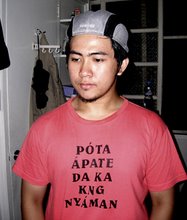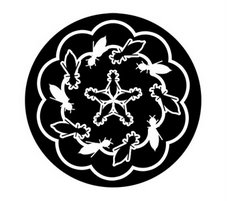I never knew how Jalung looked like. I don't even know how to get there alone. But as a child, I would hear conversations between Ima and distant relatives mentioning Jalung (pronounced 'Alung'). I know that Atsing Beth, who became my yaya many years ago as a tyke, is a resident of Jalung, but like any other Angeleño (even though I was frequently tagged a weirdo due to my distinct esoteric-meets-rebel-like personality, whatever that means), I never bothered to know anything about the rural areas of Pampanga.
But I am now a human kámaru. Gone are the days of wanting to explore the foreign world. Instead, I want to explore my hometown.
Since I was a former geek of metaphysical stuff, esoteric studies, and everything the Catholic church would deem occult or satanic, what interested me mainly about Jalung were the stories of Ima about a certain spiritist group, the weekly conventions of which my Apung Ines used to attend devotedly back in her Porac-living years (family transferred to Angeles by 1989). From Cangatba, Apung Ines would walk all the way to Jalung just to attend. Ima and Bapang Gener, as kids, would sometimes tag along riding a bicycle.
And so, I wanted to see some possession! I wanted to hear altered voices of the channels when being possessed! I wanted to experience being told by a medium that a chum is backstabbing me or my death is fast approaching. I simply wanted to see some rural magic that would bring back memories of reading papers on how to safely do astral projection and how to develop clairvoyance and psychometry!
Ding ating kálam (those who have powers) - according to Ima, this is how people called the spirit mediums.
From Angeles, I commuted all the way to Porac. Kong Jerry, husband of my first cousin Atsing Janet, drove me from their house at Cangatba to Jalung. I was told by Atsing Janet to look for Tatang Erning Laxa, the head of the spiritist group.
So we drove. Armed with my video camera and still photo camera, I was ready to document my lone trip. The narrow roads of Jalung (or, at least, the part I went to) are concrete. Houses are generally the typical post-Mt. Pinatubo eruption type of hollow-block bungalows with surviving wooden parts.


We were a bit lost. We were going cirlces in the carabao-dung-filled streets of the town. Since we didn't know the name of the group, we had to ask the residents if they knew about a spiritist group in their place. Fortunately we got to the place where the spiritist group holds its conventions every Sunday.
When I got there, I saw a lot of familiar faces--faces which I often see in family gatherings, funerals, burials, and feasts, but never bothered to get to know (not even their names), being an antisocial, private person back then. Whether they were relatives, family friends, fourth cousins, mother-of-this, niece-of-that, I didn't really know. But they all smiled at me and knew who I and my family were. It made me a bit guilty.
So I went inside. It was a relatively small airconditioned conference room with a couple of pews and goers.
Unlike the typical churches or chapels, there was no crucifix in front, no flamboyant altar, no statues of patrons and saints. What stood in the place of the crucifix was a small inanimate dove, apparently a symbol of the Holy Spirit. A woven Jesus Christ carpet was hung near the entrance.

There were three desks in front: one labeled "President," the right desk labeled "Secretary," and the middle labeled "Medium." I was intrigued at the sight of the middle desk.
On the far right is another table where a scribe jots down the message of the Holy Spirit spoken through the medium.

I was assisted by Apung Luding (Lydia Gamboa), 70 years of age, one of the nieces of my Apung Ines. It was from her I asked permission to get pictures and document in video what was happening, since she is a secretary in the group. She exuded an erudite aura and understood scientific and modern concepts most folks of her age would find intellectually challenging. For clarity, I told her that I was there to observe and study objectively, not to challenge the religion or the group. She understood quickly.
(I presented myself as an Anthropology student from UP Diliman. I found it hard and time-consuming to explain my current status in UP and my principles prompting me to make such decision of leaving my current course, Broadcast Communication.)
 Wielding my powers of observation, I got to know the name of the group: Bunduc ning Betaña (since 1950). I believe the name was lifted from a passage in the Bible. For non-Kapampangans, the group's name means Mount Betaña.
Wielding my powers of observation, I got to know the name of the group: Bunduc ning Betaña (since 1950). I believe the name was lifted from a passage in the Bible. For non-Kapampangans, the group's name means Mount Betaña.According to Apung Luding, unlike other sects or Christian subgroups, Betaña is in touch with the Holy Spirit, the sanctifier. The other members of the Holy Trinity have other functions: Jesus Christ is the Savior and the Almighty Father is the Creator.
Anyone who joins the conventions of Betaña is called a spiritist. In their group, you don't have to be a medium for you to be called a spiritist.
I was offered a seat in the front to witness better. The medium--a fairly innocent-looking old woman with white hair--sat in the middle desk. After some non-graphic rituals, she suddenly fainted, but to no surprise. The people knew her spirit just temporarily got out to give way to the Holy Spirit.
When the medium got to her feet, if she's not really faking it, I can tell that there was really a change of personality and impression based on her face and how she looked at the people. To me, it's as if she suddenly became a very wise person who knew all the secrets of the cosmos.
Then she started talking with a commanding, preachy voice (in fluent Kapampangan). Unlike the features I often see in free TV where possessed channels suddenly adopt midget speech, there wasn't any change in the voice, except in the manner of delivery and level of conviction.
Behind her is an assistant of sort holding a microphone, following the movement of the medium. Sometimes, saliva would drip out of the mouth of the medium. The assistant would then wipe it off, because the medium seemed to not notice it at all, as if detached from physical stimuli.
I listened to what the "Holy Spirit" had to say. I have to admit, I was trying to spot anything that I would find objectionable or politically incorrect, but to my amazement, the teachings of the so-called Spirit were practical and valuable lessons about middle class life--about man's constant struggle to find and hoard money, about hunger, etc. No Ang Tamang Daan VS Ang Dating Daan style of preaching and lambasting. In short, the things being uttered make sense in the real world--which is what's important for me.
The convention seemed like a class; the possessed medium was the teacher and the people were the students. The people were free to ask questions and the medium would answer. Sometimes, like a teacher, the medium would throw a question, and people would answer. An interactive 'mass.' Not much ritualistic stand up-sit down-amen-peace-be-with-you.
The medium would quote the Bible sometimes. A couple of people would verify if the medium was correct in her citations. If the medium committed a flaw, they would abort the convention, for "a pretentious evil spirit is inhabiting the medium to mislead people." In my visit, there were no wrong citations. (Although it would have been more interesting on my part if I had encountered a pretentious spirit possession scene there.)
Then, a woman who was to fly to another country approached the medium and asked for blessings and safety guidelines. As Ima told me, the Spirit would either say something reality-based, like "Go to this hospital and look for an American doctor", or something mystical like "Secure a white hanky, fold it twice, and pin it under your pillow."
I have stories about the mystical instructions given to my grandmother back in her days, but I'll save them for another entry.
The woman was told to secure a white hanky and insert it under her shirt during her flight.
The channel then (still possessed) began singing more teachings, still in Kapampangan. I have documented a portion of her singing, which I have uploaded in my Podcast. Click on the Betania track on my Podcast on your right to listen.
After that, the people sang a few Kapampangan praise songs. I was entertained because the songs were in Kapampangan. How could I not document that part, too?
And the Spirit left. The medium is back to her old innocent-looking character. The people were dismissed, but some people privately approached some channels to be healed. One old man claimed to have been cured from a deadly disease by the Spiritists and he seemed very healthy.

I asked Apung Luding what kálam meant. She said, "Kálam means the grace of God. Everyone has it, but only those with pure intentions can wield it and use it to share the wisdom of Heaven."
Apung Luding invited me to her house afterwards. In there we got to know each other more. However, I'll spare you the details in another entry.








3 comments:
(English translation follows Capampangan) Jason, casanting na nining storyang ini. Dacal cu abalu. Balu cung ing lagyung Betania atiu qng Bayung Tipan. Aini qng lalam ing acalap cu diquil qng Betania. Jason, this is such a nice story. I learned a lot. I know that the name Bethany is in the New Testament.
-- vicrom
Here is what I gathered about Bethany:
A village of Palestine, fifteen furlongs, or one mile and three-quarters, east of Jerusalem, at the base of the southwestern slope of the Mount of Olives. It is not mentioned in the Old Testament; in the New Testament it comes into prominence as the Village of Mary, Martha, and Lazarus, and as the scene of the great miracle of the raising of Lazarus to life by Jesus. Here Jesus often received hospitality in the house of his friends, Mary, Martha, and Lazarus; and near this village Jesus ascended into Heaven. The most accepted etymology of the name is Beit-æAniaæ, "House of Misery". The Talmud derives the name from Beit-Hine, or Betæuni, "House of Dates". The modern name of the village is el-æAzariye, so called from the memory of Lazarus. -- From the Catholic Encyclopaedia
Dude what is the name of your grandfather we might be related.
Hi, yeah this piece of writing is truly nice and I have learned lot of things from it about blogging.
thanks.
Feel free to surf to my blog; ford ranger forum
Post a Comment